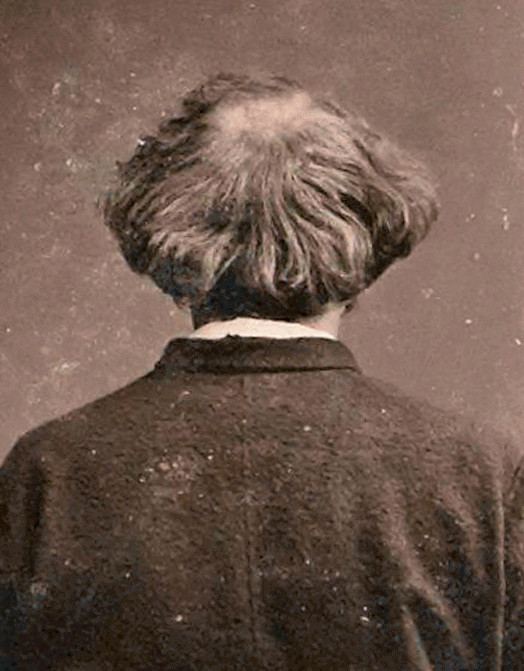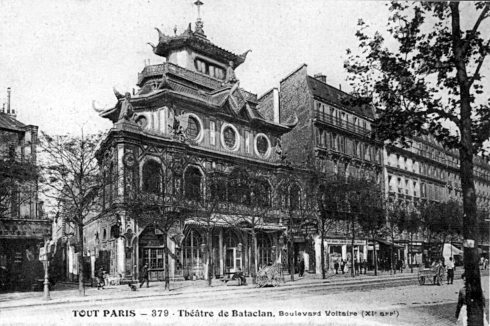|
Paulus (singer)
Jean-Paulin Habans, known as Paulus (6 February 1845 - 1 June 1908), was a French singer, entertainer and theatre entrepreneur of the ''Belle Époque''. Paulus created a complete transformation in popular singing style and in doing so he became the most popular male singer in Paris in the 1870s and 1880s. His career clearly marked a turning point in the history of French chanson: the start of the era of stardom. Early life and career Jean-Paulin Habans was born in Saint-Esprit, a suburb of Bayonne. While he maintained all his life that he was born into a family of small shopkeepers, in reality and according to his birth certificate his father was unknown and Habans the name of his mother, born Jeanne-Marie Habans, with no profession. The new genre was typified by "a frantic, disjointed movement that was seen as ..epileptic and puppet-like" that the theatre critic Francisque Sarcey termed ''gambillard'' in relation to the mimicking of the gesticulations and dislocations of puppets ... [...More Info...] [...Related Items...] OR: [Wikipedia] [Google] [Baidu] |
Nadar
Gaspard-Félix Tournachon (5 April 1820 – 20 March 1910), known by the pseudonym Nadar, was a French photographer, caricaturist, journalist, novelist, balloon (aircraft), balloonist, and proponent of Aircraft#Heavier-than-air – aerodynes, heavier-than-air flight. In 1858, he became the first person to take aerial photographs. Photographic portraits by Nadar are held by many of the great national collections of photographs. His son, Paul Nadar (1856–1939), continued the studio after his death. Life Gaspard-Félix Tournachon (also known as Nadar) was born in early April 1820 in Paris, though some sources state he was born in Lyon. His father, Victor Tournachon, was a printer and bookseller. Nadar began to study medicine but quit for economic reasons after his father's death. Nadar started working as a caricaturist and novelist for various newspapers. He fell in with the Parisian bohemian group of Gérard de Nerval, Charles Baudelaire, and Théodore de Banville. His friends ... [...More Info...] [...Related Items...] OR: [Wikipedia] [Google] [Baidu] |
Paulus By Sem
Paulus is the original Latin form of the English name Paul. It may refer to: Ancient Roman * Paul (jurist) or Julius Paulus (fl. 222–235 AD), Roman jurist * Paulus (consul 496), politician of the Eastern Roman Empire * Paulus (consul 512), Roman politician * Paulus Catena (fl. 353–362 AD), Roman notary * Lucius Aemilius Paulus Macedonicus (229–160 BC), Roman general Christianity Popes * Pope Paul I (Pope from 757–767) * Pope Paul II (Pope from 1417–1471) * Pope Paul III (Pope from 1534–1549) * Pope Paul IV (Pope from 1555–1559) * Pope Paul V (Pope from 1605–1621) * Pope Paul VI (Pope from 1963–1978) Other Christians * Paul the Apostle (5–67 AD) * Paulus (bishop of Alexandretta) (fl. 518), Bishop of Alexandria Minor * Paul the Deacon or Paulus Diaconus (ca. 720 – 800 AD), Italian Benedictine monk * Paulus Jovius (1483–1552), Italian bishop * ''Paulus'' (oratorio), 1836 oratorio by Mendelssohn Various * Paulus (surname), includes a list of people ... [...More Info...] [...Related Items...] OR: [Wikipedia] [Google] [Baidu] |
Bataclan (theatre)
The Bataclan () is a theatre located at 50 Boulevard Voltaire in the 11th arrondissement of Paris, France. Designed in 1864 by the architect Charles Duval, its name refers to '' Ba-ta-clan'', an operetta by Jacques Offenbach. Since the early 1970s, it has been a venue for rock music. On 13 November 2015, 90 people were killed in a coordinated terrorist attack in the theatre. History Origin and use The Bataclan originated as a large '' café-concert'' in the Chinoiserie style, with the café and theatre on the ground floor and a large dance hall at first-floor level. Its original name was Grand Café Chinois. The French name "Bataclan" refers to the Offenbach operetta, but it is also a pun on the expression ''tout le bataclan'' (the "kit and caboodle", or "all that jazz", or "the whole nine yards"), the oldest written use of which predates Offenbach by almost a century, in a journal entry of 11 November 1761 by Charles Simon Favart. Concerts were held there but it was best ... [...More Info...] [...Related Items...] OR: [Wikipedia] [Google] [Baidu] |
Léon Garnier
Léon Garnier (1856 in Lyon – 1905 in Meung-sur-Loire (Loiret)) was a French 19th-century composer and lyricist. Garnier wrote numerous songs with , and particularly two songs, created by Paulus, which were met with enormous success in their time, ' and ''Le Père la Victoire''. Works (selection) * ''Le Lendemain matin'', chansonnette, lyrics and music by Delormel and Garnier, 1884 * ''À trente-cinq ans'', chansonnette, lyrics and music by Delormel and Garnier, 1885 * ''De c'côté-ci, de c'côté-là !'', chansonnette, lyrics and music by Delormel and Garnier, 1885 * ''En v'nant de Montmorency'', chanson, lyrics and music by Delormel and Garnier, 1885 * ''La Montre en argent'', chansonnette, lyrics and music by Delormel and Garnier, 1885 * ''Exploits d'huissier'', monologue by Garnier and Charles-Albert d'Appy, 1885 * ''Le Signe de la croix'' and ''Ah ! qu'j'ai mal au pied'', 2 monologues comiques by Garnier and d'Appy, 1885 * ''Briscard et Pitou'', duo-bouffe ... [...More Info...] [...Related Items...] OR: [Wikipedia] [Google] [Baidu] |
Coup D'état
A coup d'état (; French for 'stroke of state'), also known as a coup or overthrow, is a seizure and removal of a government and its powers. Typically, it is an illegal seizure of power by a political faction, politician, cult, rebel group, military, or a dictator. Many scholars consider a coup successful when the usurpers seize and hold power for at least seven days. Etymology The term comes from French ''coup d'État'', literally meaning a 'stroke of state' or 'blow of state'. In French, the word ''État'' () is capitalized when it denotes a sovereign political entity. Although the concept of a coup d'état has featured in politics since antiquity, the phrase is of relatively recent coinage.Julius Caesar's civil war, 5 January 49 BC. It did not appear within an English text before the 19th century except when used in the translation of a French source, there being no simple phrase in English to convey the contextualized idea of a 'knockout blow to the existing administratio ... [...More Info...] [...Related Items...] OR: [Wikipedia] [Google] [Baidu] |
Revue
A revue is a type of multi-act popular theatrical entertainment that combines music, dance, and sketches. The revue has its roots in 19th century popular entertainment and melodrama but grew into a substantial cultural presence of its own during its golden years from 1916 to 1932. Though most famous for their visual spectacle, revues frequently satirized contemporary figures, news or literature. Similar to the related subforms of operetta and musical theatre, the revue art form brings together music, dance and sketches to create a compelling show. In contrast to these, however, revue does not have an overarching storyline. Rather, a general theme serves as the motto for a loosely-related series of acts that alternate between solo performances and dance ensembles. Owing to high ticket prices, ribald publicity campaigns and the occasional use of prurient material, the revue was typically patronized by audience members who earned more and felt even less restricted by middle-class ... [...More Info...] [...Related Items...] OR: [Wikipedia] [Google] [Baidu] |
Georges Ernest Boulanger
Georges Ernest Jean-Marie Boulanger (29 April 1837 – 30 September 1891), nicknamed Général Revanche ("General Revenge"), was a French general and politician. An enormously popular public figure during the second decade of the Third Republic, he won multiple elections. At the zenith of his popularity in January 1889, he was feared to be powerful enough to establish himself as dictator. His base of support was the working districts of Paris and other cities, plus rural traditionalist Catholics and royalists. He promoted an aggressive nationalism, known as revanchism, which opposed Germany and called for the defeat of the Franco-Prussian War (1870–71) to be avenged. The elections of September 1889 marked a decisive defeat for the Boulangists. Changes in the electoral laws prevented Boulanger from running in multiple constituencies and the aggressive opposition of the established government, combined with Boulanger's self-imposed exile, contributed to a rapid decline of t ... [...More Info...] [...Related Items...] OR: [Wikipedia] [Google] [Baidu] |
Revanchism
Revanchism (french: revanchisme, from ''revanche'', "revenge") is the political manifestation of the will to reverse territorial losses incurred by a country, often following a war or social movement. As a term, revanchism originated in 1870s France in the aftermath of the Franco-Prussian War among nationalists who wanted to avenge the French defeat and reclaim the lost territories of Alsace-Lorraine. Revanchism draws its strength from patriotic and retributionist thought and is often motivated by economic or geopolitical factors. Extreme revanchist ideologues often represent a hawkish stance, suggesting that their desired objectives can be achieved through the positive outcome of another war. It is linked with irredentism, the conception that a part of the cultural and ethnic nation remains "unredeemed" outside the borders of its appropriate nation-state. Revanchist politics often rely on the identification of a nation with a nation state, mobilizing sentiments of ethnic nat ... [...More Info...] [...Related Items...] OR: [Wikipedia] [Google] [Baidu] |
Bastille Day
Bastille Day is the common name given in English-speaking countries to the national day of France, which is celebrated on 14 July each year. In French, it is formally called the (; "French National Celebration"); legally it is known as (; "the 14th of July"). The French National Day is the anniversary of the Storming of the Bastille on 14 July 1789, a major event of the French Revolution, as well as the Fête de la Fédération that celebrated the unity of the French people on 14 July 1790. Celebrations are held throughout France. One that has been reported as "the oldest and largest military parade in Europe" is held on 14 July on the Champs-Élysées in Paris in front of the President of the Republic, along with other French officials and foreign guests. History In 1789, tensions rose in France between reformist and conservative factions as the country struggled to resolve an economic crisis. In May, the Estates General legislative assembly was revived, but members of th ... [...More Info...] [...Related Items...] OR: [Wikipedia] [Google] [Baidu] |
Alcazar D'Été
The Alcazar d'Été was a Café-concert which opened in 1869, at 8 Avenue Gabriel in Paris, and closed in 1914. The old Café Morel behind the Élysée Palace was acquired in 1869 by Arsène Goubert who at the time was owner of the " Alcazar" at 10 Rue du Faubourg Poissonière. He gave it the name "Alcazar d'Été", and the "Alcazar" became "Alcazar d'Hiver". It is today the "Pavilion Gabriel". Principal Artists Featured * Thérésa (Emma Valladon) * Paulus (comic singer Jean-Paul Habans) * Polin (French singer) (Pierre-Paul Marsalés) * La Belle Otero * Mistinguett * Yvette Guilbert * Fragson * Paula Brébion External links * See many contemporary posters by Jules Chéret Jules Chéret (31 May 1836 – 23 September 1932) was a French painter and lithographer who became a master of ''Belle Époque'' poster art. He has been called the father of the modern poster. Early life and career Born in Paris to a poor but ... advertising ''Alcazar d'Été'' References Fr ... [...More Info...] [...Related Items...] OR: [Wikipedia] [Google] [Baidu] |







